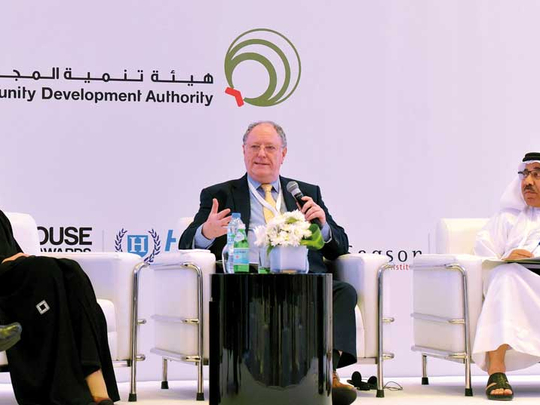
Dubai: The lack of accurate and comprehensive data on people of determination entering the workforce and the need for a change in people’s mindsets about social inclusion remain as the top two challenges in making Dubai a barrier-free city for people of determination, officials said on Sunday.
Prominent experts, researchers, academics, government officials, and advocates of social inclusion from different countries gathered in Dubai on Sunday for the first International Conference on Inclusive Employment and Occupational Learning to discuss international best practices and identify the gaps in empowering people of determination.
The two-day conference kicked off on Sunday on the International Day of Persons with Disabilities. It is sponsored by the Community Development Authority (CDA) in Dubai and organised by the Qualifications House UK and the Mohammad Bin Rashid Al Maktoum Foundation.
Ahmad Julfar, CDA Director-General, said the conference is in line with the ‘My Community.. A City for Everyone’ initiative, which seeks to transform Dubai into a disability-friendly city by 2020.
He said the city is on track to achieving its goal, although there are still challenges that have to be overcome along the way.
- Shaikha Dr Alia Al Qasimi | Expert, CDA
“The question is not whether we can do it but how and when this goal is going to be achieved,” Julfar said.
But to be a friendly city to people of determination goes beyond transforming the built environment to become more accessible, he said. It also involves giving them the opportunity to thrive by allowing them to join the workforce through implementing inclusive employment across the city.
Julfar said that, to successfully do this, CDA will partner with different agencies like the Dubai Statistics Centre, Dubai Health Authority, and others to come up with a comprehensive database on people of determination in the city and their needs.
“People here are used to getting ready research results from outside or from other sources and trying to implement it here very fast. In the social sector, you cannot do that. The other challenge is the lack of accurate data,” Julfar told the media.
But besides knowing the statistics, Shaikha Dr Alia Al Qasimi, an expert at CDA and a conference speaker, said it is important to change perceptions at all levels on the employability of people of determination.
Companies and hiring professionals must go through disability etiquette trainings since “mainstreaming disability is a shared responsibility,” she said.
Inclusion begins at home
The most important barrier to be removed, however, is the stigma of disability within the family, noted Dr Naji Al Mahdi, Chief of Qualification Awards Dubai at the Knowledge and Human Development Authority.
“It’s a very common practice in most developed countries that when a family has a child that has got special needs, whether it’s mental or physical or so on, the family is trained on how to best deal with the child to bring out his potential,” Dr Al Mahdi said.
“The best way to change the mindset is at the onset.”
This kind of training is not yet compulsory in Dubai, said Dr Hesham Al Saghbini, Group CEO of Qualifications House UK, but they will recommend this as part of the conference outputs.
“At the moment it’s not compulsory here. One of the recommendations of the conference is to expand the training platform, not only to capture employers and schools but also families,” he said.







